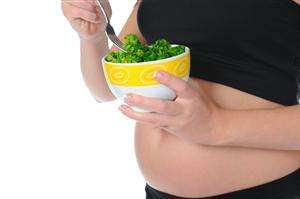Organic food and malformations in the urinary tract (hypospadias) in newborn boys

Women who ate organically produced food during pregnancy had halved likelihood of giving birth to a boy with hypospadias compared to women who never or seldom did so.
These are findings from a new study from the Norwegian Mother and Child Cohort Study (MoBa) at the Norwegian Institute of Public Health, newly published by Environmental Health Perspectives.
Hypospadias denotes a male urogenital anomaly in which the opening of the urinary tract is not positioned exactly at the tip of the penis. This condition arises during fetal life, and is surgically corrected after birth.
This study shows that mothers who report eating organic food within one or more of six food categories, had less than half the probability of delivering boys with hypospadias compared with women who reported "never or seldom" eating organic food.
From the data, organic vegetables emerge as the food category with the greatest impact on the result. The analyses take into account various background factors among the mothers, such as age, diet in general, level of education, income, and if the fetus had developed normally.
However, the results are observational and must be interpreted with caution, as there might be other differences related to organic food consumption which may have influenced the results, and because of the low number of hypospadias cases in the study. This is the first time an association between consumption of organic food and hypospadias has been shown in a cohort study and the findings must be replicated in other cohorts.
It is only in large cohort studies such as the Norwegian Mother and Child Cohort Study (MoBa) that it is possible to study the causes of rare diseases and conditions.
The study includes 35,107 women who participated in MoBa in the years 2002-2008 and answered six questions about use of organic food during pregnancy, and later gave birth to a boy. Among the infants of these mothers, 74 (0.2%) were diagnosed with hypospadias in the routine examination at birth.
There were 52 (0.3%) cases of hypospadias among infants of mothers who "never or seldom" ate organic food, and 22 (0.1%) cases of hypospadias among infants of mothers who "sometimes", "often" or "mostly" ate organic food.
The causes of hypospadias are mainly unknown, but existing evidence suggests both genetic and environmental contributors. The function of the placenta is likely to be of importance. The possible impact of a number of other factors has been investigated, including environmental contaminants such as agricultural pesticides, but so far no clear relationships have been established.
This study cannot provide an answer to why mothers who ate organic food, and in particular organic vegetables, had lower likelihood of delivering boys with hypospadias. In the article, possible explanations are proposed, among them some related to lower detectable contaminations with pesticide residues in organic compared with conventional foods, documented in Norway as well as in other countries. These are, however, purely hypothetical suggestions.
"A diet with daily adequate intake of fruit and vegetables is recommended to all pregnant women, and this study suggests that there may be additional benefits in choosing organically produced vegetables. The results are intriguing, but must be interpreted with caution," says Helle Margrete Meltzer, Research Director at the Division of Environmental Medicine at the National Institute of Public Health.
The study is financed by the Norwegian Research Council and part of a doctoral project investigating whether consumption of organic food during pregnancy is associated with health of mother and/or child.
More information: "Organic Food Consumption during Pregnancy and Hypospadias and Cryptorchidism at Birth: The Norwegian Mother and Child Cohort Study (MoBa)." Environ Health Perspect; DOI: 10.1289/ehp.1409518


















